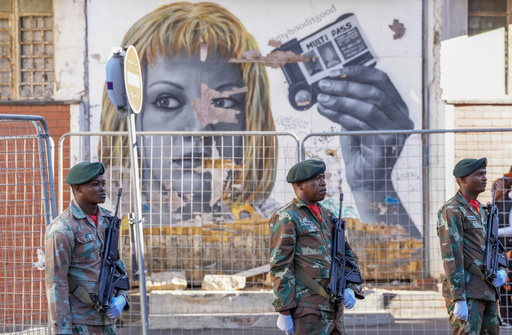CAPE TOWN, South Africa — In his annual address to the nation on Thursday, South African President Cyril Ramaphosa made clear that his country would not be intimidated by external pressures, seemingly in response to remarks made by U.S. President Donald Trump. During his speech at Parliament, Ramaphosa emphasized that South Africa would “not be bullied,” a statement interpreted as a direct reaction to Trump’s threats regarding funding.
Although Ramaphosa refrained from directly naming Trump, his comments underscored a broader sentiment regarding the rise of nationalism and protectionist policies internationally. “We are witnessing the rise of narrow interests and the decline of common cause,” he stated, highlighting the challenges for developing economies amidst such global dynamics. He expressed confidence in South Africa’s resilience, saying, “We will not be deterred” and reaffirmed a united national front to safeguard their sovereignty and democratic processes.
This segment of his address was met with applause and cheers from members of Parliament and attendees at the session, analogous to a State of the Union address in the U.S. The context of Ramaphosa’s remarks came after Trump had taken to his Truth Social platform earlier in the week, announcing that he would cease all U.S. funding to South Africa due to what he described as land confiscation and violations against certain groups, although he did not specify the groups in question.
Trump’s comments appeared to be linked to a recently enacted land expropriation law in South Africa, which allows the government to take over land for public use without compensation, primarily targeting unused properties. In response to the backlash, Ramaphosa and his administration have clarified that the move aims to enable equitable land redistribution and has legal safeguards to prevent arbitrary confiscation. They have also asserted that no land has been seized under this law.
The South African presidency condemned Trump’s statements, characterizing them as “misinformation,” especially in light of comments made by Elon Musk, Trump’s advisor and a native of South Africa, who has been vocal against the current government’s policies, alleging they are discriminatory against the white minority. Musk’s critiques stem from his views formed when he lived in South Africa before moving away in the late ’80s.
Trump’s assertion came on the heels of his directive to implement a 90-day hold on most forms of global aid, raising concerns over the potential impact on vital funding for South Africa’s comprehensive HIV/AIDS programs, which are among the largest worldwide. In his address, Ramaphosa acknowledged the seriousness of the funding freeze and indicated that steps were being taken to maintain essential health services.
While the speech revolved primarily around national issues, Ramaphosa unveiled an ambitious plan wherein the government aims to allocate $50 billion over the next three years to enhance South Africa’s infrastructure. The proposed initiatives include constructing roads, bridges, and dams, as well as modernizing ports and airports, all aimed at invigorating the nation’s economic capabilities. “This new infrastructure will power our economy,” Ramaphosa asserted, optimistic about the potential developments ahead.



